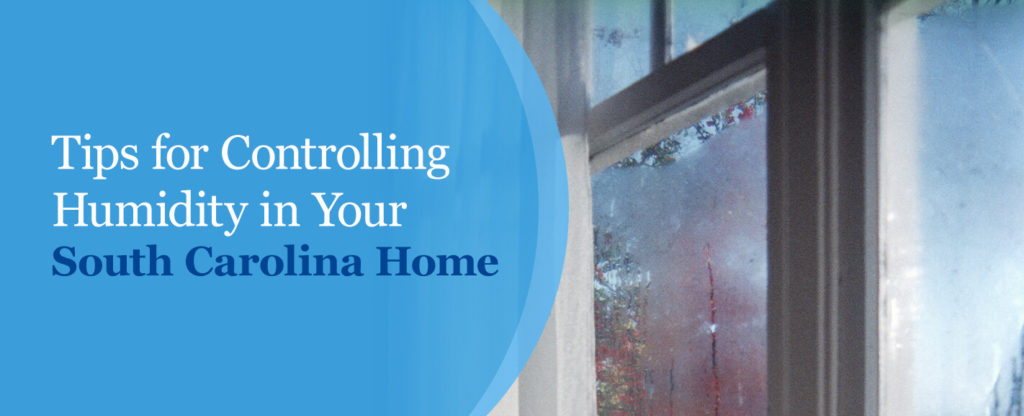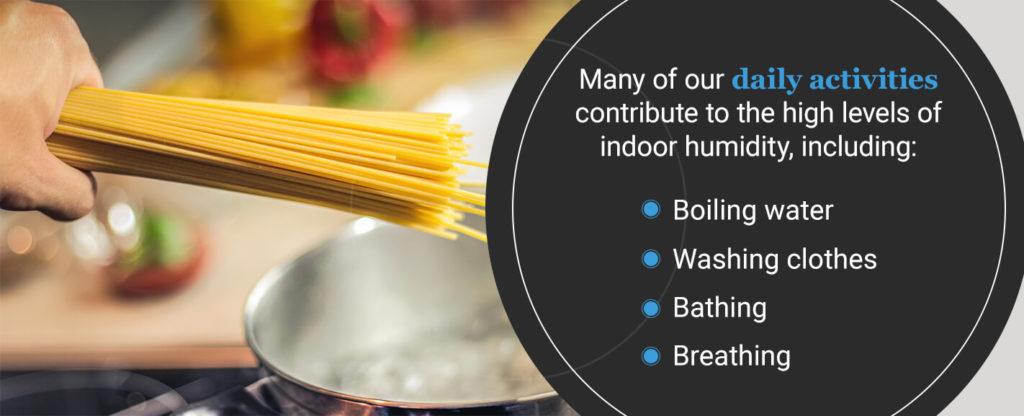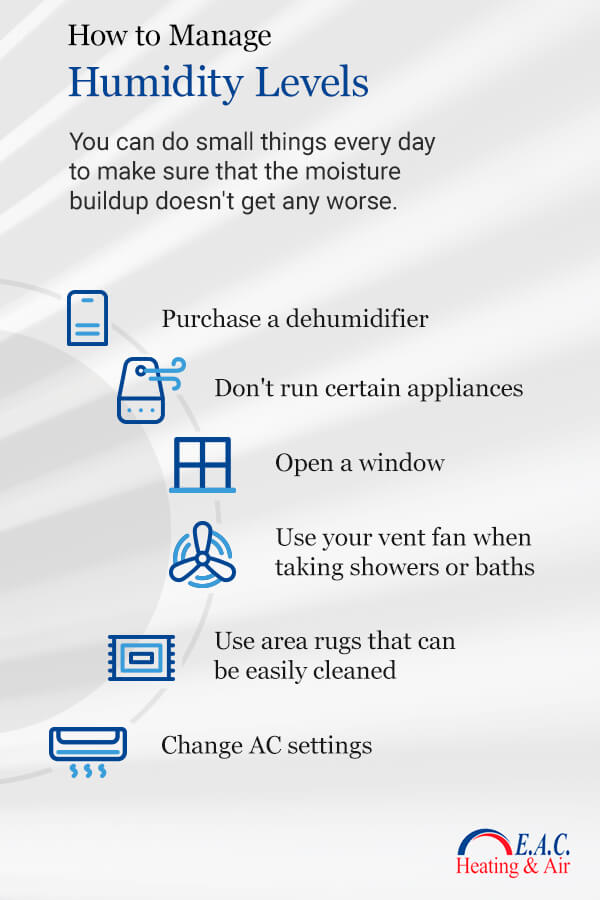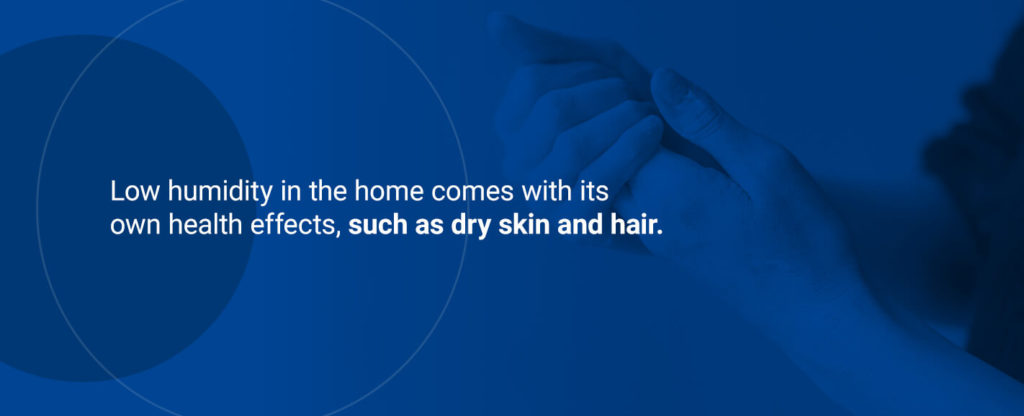
Living in South Carolina, we are all accustomed to the humidity and the heavy feeling that surrounds us each time we step outside. It is a staple to the weather conditions here in the South. Humidity can have surprisingly harmful effects on your home and your health when it starts to invade your living space.
We’re often unaware of this excess moisture buildup in our homes and don’t realize what’s happening until we experience the uncomfortable, sticky feeling that accompanies high humidity indoors. Humidity can cause damage to your home, lessen the effectiveness of your heating, ventilation and air conditioning (HVAC) unit and even contribute to harmful health effects. Staying on top of the problem and controlling moisture buildup can make a huge difference in the integrity of your home and the quality of your health.
How to Tell If Your House Is Excessively Humid
Many of us don’t notice humidity until it becomes a bigger problem. Our skin gets clammy, and the air seems to feel heavier. It becomes a problem when humidity follows us inside and starts to damage our homes and our health.
High indoor humidity comes with its own telltale signs and symptoms, many of which are easily identifiable. Here’s what to look for when determining whether humidity has become excessive in your home:
- Condensation buildup: In a humid environment, moisture starts to buildup on various surfaces. Windows and mirrors will show fog, and water droplets can be found on any exposed pipes. If you find signs of condensation, be sure to check the surrounding areas to see if condensation is spreading to other surfaces.
- Peeling paint and creaky floorboards: Look for peeling paint on your walls or wooden floorboards that creak under your weight. Often, this is a sign that humidity has potentially infiltrated these materials and is causing damage to your home.
- Rotting: Other wooden fixtures in your home, such as furniture, windowsills and doors, may start to rot.
- Moisture damage on other surfaces: Other surfaces can start to show signs of excessive humidity as well, such as walls or shelves. Check to see if these spots feel moist or softer than usual. Any condensation buildup in these locations is typically a sign of excessive humidity in your home.
- Mold or mildew: High humidity in your house can be a breeding ground for bacteria, as they thrive in warm, wet environments. Mold can grow in various places, such as the corner of ceilings, under carpets and on walls behind furniture. Mold and mildew often come with their own smell as well, sometimes leaving a musty scent in the air. We are all accustomed to the smell of our own homes, so leaving your house for a little while and coming back is the best way to check for the smell.
- Health effects and symptoms: With mold and mildew comes a slew of health problems. Look for frequent, severe headaches, allergy symptoms, coughing or shortness of breath. If these symptoms are affecting any member of your household, then humidity may be the culprit.
Alone, just one of these problems might not mean that humidity is excessive in your home. However, if you are experiencing more than one of these problems, finding ways to manage the humidity and getting your home checked out by a professional is best.
What Causes High Humidity in a House?
Humidity can creep up on us before we even realize it’s happening, especially living in South Carolina. We are already so accustomed to the high humidity levels that we don’t always notice a difference in our living environment. If your home feels humid or spot any of the signs of a highly humid environment, determine the cause of the issue so that you can implement home humidity control as soon as possible.

Identifying the cause can remedy the numerous issues that come with high levels of humidity in a home. Believe it or not, many of our daily activities contribute to the high levels of indoor humidity. These activities include boiling water, washing clothes, bathing and breathing, which are just a few of the main sources of humidity in the home.
There are other causes of high humidity beyond the things we do daily as human beings. This can be water leakage from pipes or faulty showerheads and drippy sink faucets. Certain construction materials can be at fault as well. Newly installed construction materials, such as wood, insulation and plaster, can release humidity if they have retained any moisture.
Damp ground conditions that invade the spaces under or around your home also contribute to the humidity you experience in your home. Certain materials, such as timber, soak up the moisture from the ground and trap it. The wood can release this moisture into your home, adding excessive humidity to the environment.
South Carolina, in particular, has higher rates of humidity than other states due to its location close to the water in a warm climate. Naturally, humidity levels are higher in a South Carolina home. The air-conditioning units we have also play a part in the level of humidity we experience. A faulty or incorrectly sized unit may turn on and off too quickly, not giving your unit enough time to circulate the humidity through its system. This traps the humidity in your house.
Identifying the cause is key to resolving the humidity issue as soon as possible. This can reduce the cost of repairs on your house and benefit your health as well. It’s time to live comfortably and find ways to reduce the amount of moisture buildup in your home.
How to Manage Humidity Levels in Your House

Once you’ve identified the cause, you can begin to take steps to manage the humidity levels in your home to prevent the condition from getting any worse. You can do small things every day to make sure that the moisture buildup doesn’t get any worse.
Some tips to control home humidity include:
- Purchase a dehumidifier: If you’ve isolated a location that is the source of your excess moisture, such as a bathroom, kitchen or basement, you can purchase a dehumidifier for that location. Extract fans also work for this same purpose. However, larger dehumidifiers can be purchased that circulate through your entire property. Some benefits to these systems are that they reduce the moisture in the air and prevent mold growth.
- Don’t run certain appliances: If you notice moisture building up on your windows or different surfaces, it’s important to turn off certain appliances — essential oil diffusers or humidifiers — as they could be contributing to the buildup.
- Open a window: It may seem simple but opening your windows for 10-15 minutes a day can help decrease the moisture in your home by increasing ventilation. Ideally, opening windows that are on opposite sides of your home is best, as air can circulate more freely this way.
- Use your vent fan when taking showers or baths: When we bathe, we are introducing a lot of moisture into the air that can get trapped. You’ve probably noticed your mirror fogged up every time you step out of the shower. By turning on your vent fan each time you bathe, you can suck up and expel that moist air elsewhere so it doesn’t get trapped in your home.
- Use area rugs that can be easily cleaned: Although area rugs can bring just the right amount of sparkle to your interior design, they can also trap moisture and allow bacteria to grow. Look for area rugs that you can easily pick up and clean frequently, removing the chance for any harmful pollutants to invade your space.
- Change AC settings: If you leave your AC running all the time, try changing it to “auto” instead. This gives your unit the proper time to clear out the moisture in the air before kicking back on again.
Getting rid of excess moisture is incredibly important to maintain a healthy home. However, it’s important to have somehumidity present in your home. Ideal humidity levels are anywhere between 35%-50%, so getting rid of humidity entirely shouldn’t be the goal. Dry air can also cause health concerns, so keeping moisture within reasonable levels is good for our overall health.
What You Can Do Indoors and Outdoors to Control Humidity
The solution for high humidity in the home can vary, depending on what’s causing it in the first place. Addressing these issues head-on allows you to improve moisture control in your house.
Here’s how to lower humidity in your house using strategies in and around your home:
- Fix pipes and leaks: Often, humidity issues come from leaky pipes or faulty faucets. It is important to get these issues fixed as soon as possible because they can spread their moisture to other surfaces and cause mold to grow and develop, which is hazardous to our health.
- Make sure your HVAC unit is running properly: Your heating, ventilation and air conditioning (HVAC) system helps prevent humidity in your home by circulating air and cooling it. Sometimes, our HVAC units can start to malfunction, especially if we’ve had them for a long time or they’ve sustained some damage over the years. Most units should be replaced every 10 years, but this is not always the case. If you’re uncertain, always consult a professional and have them check your unit to determine if you need an upgrade.
- Keep gutters clean and foundations clear: When moisture builds up outside our homes, it has no place to go but in. Keeping your gutters clean and downspouts clear reduces the chances of that buildup seeping into your property. Sloping excess soil away from your foundation helps keep any extra water from pooling around your home and causing damage that can cause higher humidity levels.
- Keep crawl spaces well ventilated: Dirt crawl spaces soak up moisture that can seep into your home. Be sure to keep these areas well ventilated and cover them with a vapor barrier where possible.
- Check your insulation: If your insulation has been damaged and contains too much moisture, it is best to replace it. Insulation that is properly installed and undamaged keeps out excess moisture on its own and protects your home from excess humidity.
- Get houseplants: Some houseplants can reduce home humidity by taking moisture right out of the air. Plant species that can prevent home humidity include peace lilies, Boston ferns, orchids, cacti and more! If you have a pet, be sure to look for plants that are safe for your furry friends.
Using these tips, you can restore the humidity in your home to safer levels. You will feel more comfortable, and your house will suffer less damage because of it. You may also experience fewer health concerns and make your home a healthier environment, so it is best to get these issues resolved as soon as possible.
Effects of Humidity on Health

Both low and high humidity can potentially cause health concerns. Low humidity in the home comes with its own health effects, such as dry skin and hair. Dry air can also increase our susceptibility to viruses, like a cold or the flu.
High humidity can be dangerous for your health too. Here are just a few of the effects you may experience if the humidity levels in your home are too high:
- Severe headaches
- Shortness of breath
- Coughing or wheezing
- Other allergy symptoms
Many of these symptoms occur because high levels of moisture bring mold and mildew, which are dangerous to our health. Mold produces allergens, which are substances that cause allergic reactions. These reactions can be mild but are often more severe in sensitive individuals and those with asthma. Symptoms include irritation in the eyes, nose, skin and throat.
Mold can also produce something called mycotoxins, which have more serious effects, such as poisoning, a weakened immune response and cancer. It’s important to be mindful of these potential effects as the long-term damage can be harmful to your well-being.
Humidity also plays a part in our sleep cycle. When humidity levels are too high, we experience issues with non-rapid eye movement (NREM) and rapid eye movement (REM). These issues can cause a decrease in our overall health, as both NREM and REM are crucial to our sleep cycle. Our memory may worsen, and our ability to recover from illness or injury may take longer.
It is so important to pay attention to the humidity levels in your home. If you are currently experiencing any of these health issues, determine if excessive humidity is the cause.
Breathe Better and Live Comfortably With E.A.C. Heating & Air
You deserve to live in a comfortable, healthy home. High levels of humidity can cause your HVAC unit to function improperly, leading to less air circulating in your home and an overall warmer climate indoors.
If controlling home humidity has become a problem for you, we can help! E.A.C. Heating & Air is dedicated to bringing you high-quality service and can help bring your humidity levels back to healthy levels. Reach us at 843-681-3999 or use our online contact form to start addressing the high humidity in your home today.

